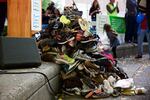On a cold mid-October day in Bend, Talie Wenick rode to the grocery store in the rain the only way she knew how: on a bike.
Wenick, a single mom, needed to buy food and diapers. She had her 2-year-old baby boy strapped to the back seat. She also carried with her the weight of her drug and alcohol addiction.
Before this point, Wenick had a college education, a house, cars and a husband. They divorced, and her new boyfriend introduced her to meth.
She did the grocery shopping and cried the entire way home, she and her baby boy cold and wet. “There has got to be an easier way,” Wenick thought.
Wenick’s transportation struggle was just one of a list of barriers that she says women in rural Oregon face when trying to recover from drug and alcohol addiction. Getting to a treatment facility was virtually impossible, she said.
Wenick spoke in front of a crowd in downtown Portland Saturday to help launch Oregon Recovers, an advocacy program seeking to transform Oregon’s addiction treatment system. More than 1,000 people turned out in support of the program, which aims to make Oregon No. 1 for access to immediate addiction treatment and recovery services nationwide in the next five years.
“You know I’m so envious of the people in Portland," Wenick said. “They have so many advantages, but in Central Oregon we have none. We have very limited transportation — at the time I got clean, we didn’t have any. In Portland, they have a lot of sober housing, in Central Oregon we only have one.”
In Oregon, 1 in 10 people experiences drug or alcohol addiction. But some former addicts say catch-all services often leave people behind because they don’t meet the specific needs of addicted individuals.

A pile of shoes labeled with the name of someone lost to alcohol or drug addiction at a rally for recovery on Sept. 30, 2017.
Ericka Cruz Guevarra / OPB
By the 12th year of her addiction, Wenick had her son taken away from her. She was homeless and jobless while she waited to get into the lone residential treatment facility for women in Central Oregon. The next closest were in Portland, 180 miles away, and Klamath Falls, 140 miles away.
“That’s the problem,” Wenick said. “For an addict in their active addiction, you got to strike when the iron’s hot. There are so many deaths between the time they’re ready to do it and they actually get a bed in a treatment facility.”
Pablo Caprotta, a Latino immigrant, said he found it hard to connect with people at treatment facilities because they didn’t look or sound like him.
“It’s not the same to express yourself in your native language than it is to express yourself in your second language, no matter how well you speak that language,” he said.
Caprotta immigrated from Buenos Aires, Argentina, in 1997. He says his road to addiction was culturally specific, too. It took him years to admit that he needed help for his addiction, he said, in part because of the cultural stigma associated with talking to his family about it.
“As an addict, the disease is the same for a lot of us. But also as an immigrant, it affects different areas of our lives and therefore the recovery needs to be a little bit different,” Caprotta said.
At the rally, Caprotta spoke in front of the crowd about his recovery in English and then in Spanish. At another point, a woman stepped up to the podium to tell the crowd to respect everyone’s individual path to recovery.
“We’ve got to hold each other responsible for showing compassion to another suffering addict who many do harm reduction or recovery different from us,” she told the crowd.